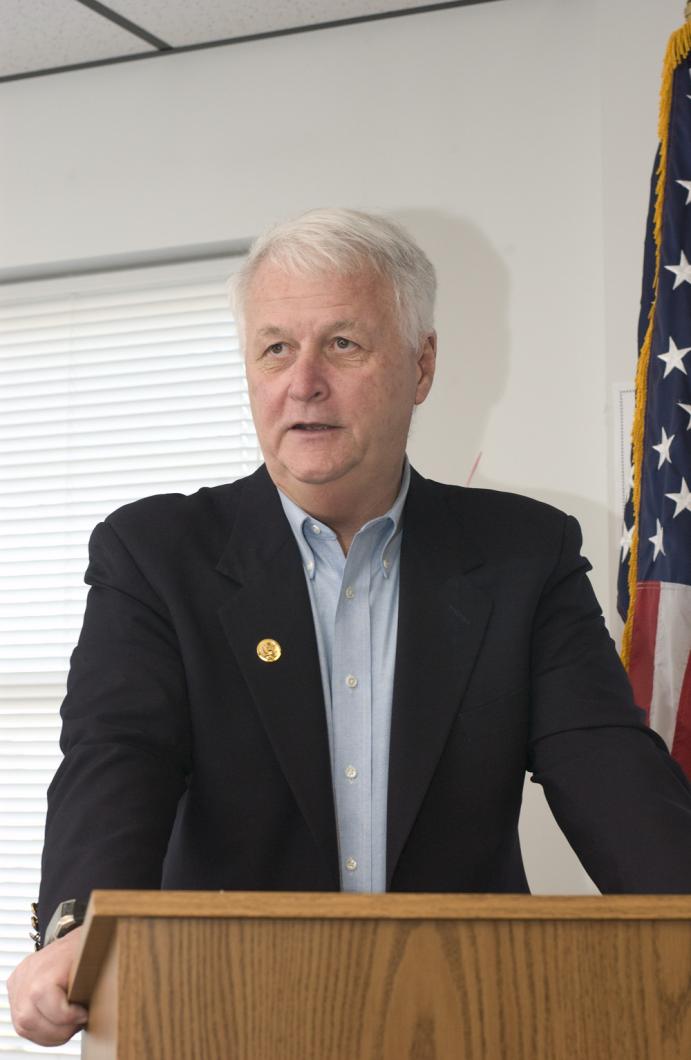Hours after adding his vote to an $825 billion federal stimulus package, Massachusetts Cong. William D. Delahunt was on the Vineyard yesterday to provide an economic backdrop for the bill to a group of Vineyard town and regional leaders.
Though much of his message was bleak, Mr. Delahunt offered hope in the form of coaching for secure programs and project funding as a result of the stimulus package and the promise of an upward economic trend some way off in the future.
“I don’t think it’s hyperbole to say it’s the toughest year,” said the congressman, “but we’ll get through this year and there may be droplets of sunshine through extremely dark clouds. And in 2010, there may be a sunny day or two.”
Mr. Delahunt was joined by chief of staff Mark Forrest, Cape and Islands representative for environmental, coastal and fishing projects Christopher Adams, and Cape and Islands State Rep. Timothy Madden. The congressman said the officials will be crucial points of contact in the coming year.
“No doubt Mr. Madden will be an aggressive advocate at the state house, in making sure the Island receives more than its fair share,” said Mr. Delahunt.
Mr. Madden extended Mr. Delahunt’s metaphor for his own economic forecasting.
“There may be slivers of sunshine but there’s no rainbow with pots of gold at the end,” he said, adding to a call from Mr. Delahunt for regional cooperation. “Every opportunity for regionalization we want to explore,” Mr. Madden said.
Mr. Delahunt opened the meeting saying that federal decisions are tested at the local level of government.
“You’re where the rubber meets the road. That’s why we wanted to come here today,” he said.
He was upbeat about the bill, titled the American Recovery and Reinvestment Act, which passed despite receiving no votes from the Republican minority.
“Clinton’s first budget passed during a tight economic period,” he said, adding: “It also received no Republican support. It was the catalyst for eight to nine years of economic prosperity.”
Mr. Delahunt said more money is on the way, acknowledging that all this spending will bring with it its own set of problems.
“We’re getting ourselves deeper and deeper in the hole. The federal government has to have a plan for when inflation comes because of the borrowing. That’s a different problem but right now there’s no choice. This president inherited a mess,” he said. “But there’s lots of soldiers coming back form Iraq and Afghanistan that are going to need life-long care.”
According to an analysis released last week by the office of House Speaker Nancy Pelosi, the recovery and reinvestment act will bring a 1.9 per cent drop in employment to Massachusetts by the end of next year, with the creation of 95,000 jobs. Meanwhile, Mr. Delahunt said some 70,000 jobs were lost in America this Monday alone. But, he maintained, that job creation was not the only priority.
“While we’re trying to create jobs, we’re aware of the stresses of municipal and state budgets. It just doesn’t make sense to create jobs and watch municipalities make massive layoffs,” he said.
Mr. Madden said that at the state level the stimulus program has helped to cushion the blow from the latest round of cuts.
“Everyone has been banking on the new administration,” said Mr. Madden. “Banking being the key word.”
The recent cuts have not affected the Vineyard as much as anticipated. Level funding for education aid Chapter 70 money, and state forest payment in lieu of taxes has kept funding cuts for the present year and fiscal year 2010 relatively low.
A rare combination of circumstances including town budget pressures, a new federal administration and calls for regional cooperation amid an economic crisis, has brought Island leaders together several times over the past few weeks.
Many in attendance yesterday had taken part in a scramble three weeks ago to prepare applications for so-called shovel-ready projects that would be eligible for federal funding under the stimulus package.
Mr. Forrest underscored that the prerequisite for these projects is that they are ready to go.
“Shovel-ready means permit in hand,” he said.
Several selectmen said their projects lack sufficient funds to become shovel-ready and qualify for the aid. “We’re stuck in a catch-22,” said West Tisbury selectman Richard Knabel, touting a wind turbine project which is in the early stages of development.
Oak Bluffs selectman Kerry Scott had a similar complaint regarding a project to rejuvenate the Oak Bluffs waterfront.
Mr. Forrest said there are other revenue streams, and he advised going to several aid agencies to secure funding for one project.
“It’s the Chinese menu approach,” he said. “You just have a lot more doors to knock on now for money.”
Mr. Delahunt echoed the sentiment.
“There are options, don’t get so lost in the stimulus piece that you don’t consider the others,” he said.
A wastewater proposal to connect the Martha’s Vineyard Regional High School to the Oak Bluffs treatment plant was met with enthusiasm by the state officials.
The project was plugged by Oak Bluffs selectman Ron DiOrio.
“It’s engineered and ready to go,” he said of the $1.4 million proposal.
“How many jobs?” asked Mr. Delahunt.
“You tell me how many you want and we’ll create them,” answered Mr. DiOrio.
Mr. Delahunt said that the issue of job creation will be a necessary hurdle to jump in grant writing.
“In terms of the bureaucracy those questions will be posed. Think creatively,” he said.
Closing the meeting, Mr. Delahunt again underscored the importance of cooperation.
“As the state views grants — and more so at a federal level — they’re going to really require working together. At some level there will be discomfort and adjustments. We’re all resistant to change,” said Mr. Delahunt, “But it’s really important.”




Comments
Comment policy »